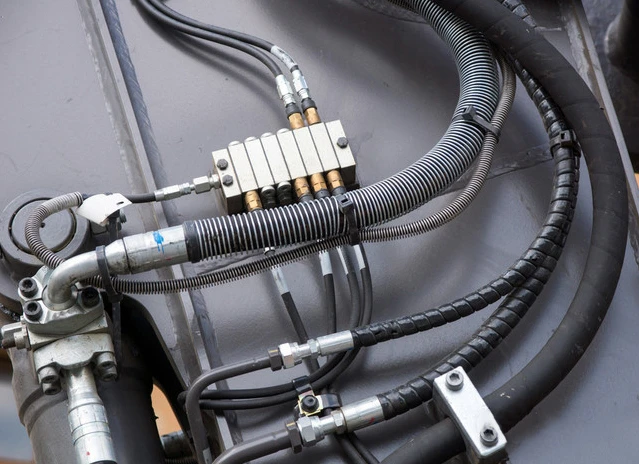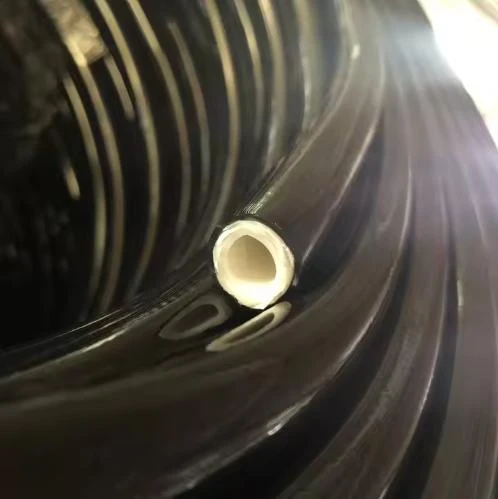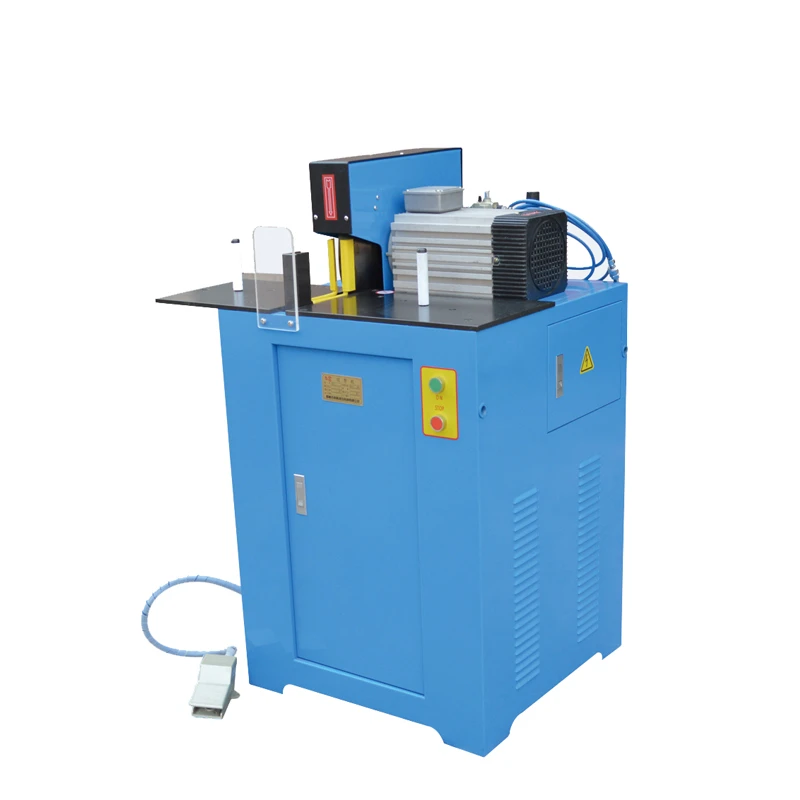Selang Termoplastik Kab
A thermoplastic hydraulic hose is a lightweight, flexible hose made from advanced plastic materials such as nylon, polyurethane, or polyester, designed for use in hydraulic systems. Unlike traditional rubber hoses or steel-reinforced hoses, thermoplastic hoses feature a smooth plastic inner tube, one or more layers of synthetic fiber or wire reinforcement, and a durable outer plastic cover. They are highly resistant to abrasion, chemicals, and UV exposure, making them ideal for applications in harsh environments. Thermoplastic hoses are lighter than rubber hoses, making them easier to handle and install, especially in mobile or lightweight equipment. Additionally, they offer superior flexibility and tighter bend radii without compromising performance, making them suitable for complex or confined installations. Their non-conductive properties make them an excellent choice for electrical-sensitive environments, while their resistance to moisture and low-temperature flexibility extends their usability in outdoor and cold-weather applications. These features distinguish thermoplastic hoses as a versatile and durable solution for hydraulic systems requiring lightweight and reliable performance.
What Are the Key Advantages of Using Thermoplastic Hydraulic Hoses?
Thermoplastic hydraulic hoses offer several distinct advantages over traditional hoses, making them ideal for specific applications. Their lightweight construction simplifies handling and installation, particularly in mobile equipment or situations where weight is a critical factor. These hoses are highly resistant to abrasion, chemicals, and UV exposure, ensuring a longer lifespan even in harsh outdoor or industrial environments. Thermoplastic hoses exhibit excellent flexibility, allowing for tighter bend radii and easier routing in confined spaces without the risk of kinking. Their non-conductive properties provide safety in electrical-sensitive applications, such as equipment near power lines or in high-voltage environments. Additionally, thermoplastic hoses are resistant to moisture absorption, maintaining consistent performance in wet or humid conditions. They also perform well in extreme temperatures, remaining flexible in cold weather and resistant to heat degradation. Their smooth inner surface minimizes pressure loss and ensures efficient fluid flow, further enhancing system performance. These attributes make thermoplastic hoses a preferred choice for lightweight, durable, and high-performing hydraulic systems.
What Factors Should You Consider When Choosing a Thermoplastic Hydraulic Hose?
When selecting a thermoplastic hydraulic hose, several factors must be carefully evaluated to ensure compatibility and optimal performance. The first consideration is the operating pressure of the hydraulic system; the hose must have a pressure rating that meets or exceeds the system's requirements. Temperature range is another critical factor, as thermoplastic hoses are designed to handle extreme temperatures, but it is essential to confirm compatibility with the system’s operating and environmental conditions. Fluid compatibility is crucial to prevent chemical reactions that could degrade the hose materials, so ensure the selected hose can handle the specific hydraulic fluid in use. The hose size, including its inner diameter, length, and bend radius, should match the system requirements to maintain efficient fluid flow and proper routing. For applications exposed to abrasion, UV radiation, or chemicals, choose a hose with an outer cover that offers suitable resistance to these elements. Additionally, non-conductive properties should be considered for applications near electrical systems. By assessing these factors and consulting the manufacturer’s specifications, you can select a thermoplastic hose that ensures reliable performance and durability.
Analysis of the 5 Major Application Scenarios of Thermoplastic Hoses
As a leading thermoplastic hose manufacturer, SINOPULSE designs high-performance thermoplastic hydraulic hoses that excel in diverse industrial environments. Engineered with advanced materials like nylon and polyurethane, our hoses combine lightweight durability, chemical resistance, and specialized functionalities to solve complex fluid transfer challenges. Below, explore five key applications where our thermoplastic rubber hose solutions deliver unmatched value.
1. The Lightweight Revolution of Mobile Construction Machinery and Agricultural Machinery
In mobile machinery such as excavators, loaders, and combine harvesters, every kilogram saved improves fuel efficiency and maneuverability. SINOPULSE thermoplastic hoses (e.g., GR7/GR8 series) are 30-50% lighter than traditional rubber hoses, reducing payload while maintaining high-pressure resistance (up to 3000 PSI). Their compact bend radius (≤10D) allows easy routing in tight spaces, ideal for articulated arms and hydraulic attachments. The abrasion-resistant outer layer withstands constant vibration and contact with machinery frames, minimizing downtime from hose wear. For agricultural equipment operating in dusty, wet fields, our hoses resist UV degradation and fungal growth, ensuring long service life in harsh outdoor conditions.
2. Safe Fluid Management for New Energy Equipment
As the world shifts to electric vehicles and renewable energy, non-conductive hydraulic hoses become critical for safe operation. SINOPULSE thermoplastic hoses feature non-conductive polyurethane inner layers, making them ideal for electric vehicle battery cooling systems, wind turbine hydraulic controls, and solar panel tracking mechanisms. Unlike metal or rubber alternatives, they eliminate static discharge risks in high-voltage environments while resisting ethylene glycol-based coolants and lubricants. The smooth inner bore reduces pressure drop, improving energy efficiency in battery thermal management systems, where precise temperature control is essential for performance and safety.
3. Solution for Low-temperature Resistance in Cold Regions
In arctic mining sites, refrigeration plants, or high-altitude construction, traditional hoses often crack or lose flexibility in sub-zero temperatures. SINOPULSE high-pressure thermoplastic hoses maintain elasticity down to -40°C, thanks to their specialized polymer formulations. The GR7 model, for example, retains full functionality in freezing climates, making it perfect for hydraulic brake systems in snowplows, cold storage facility pipelines, and ice-making equipment. Their rigid yet flexible structure prevents kinking during extreme temperature cycles, ensuring reliable fluid flow without compromising on pressure ratings (up to 2500 PSI).
4. Chemical Treatment and Industrial Automation - the Preferred Choice for Corrosion Resistance
In chemical plants, pharmaceutical facilities, and food processing lines, exposure to aggressive fluids like solvents, acids, or alkalis demands hoses with superior chemical resistance. SINOPULSE thermoplastic hoses resist degradation from common industrial chemicals, outperforming rubber in applications involving ethanol, diesel, or mild acids. The smooth, non-porous inner surface minimizes fluid retention and contamination, critical for food-grade applications where hygiene is paramount. In robotic automation systems, their lightweight design reduces load on robotic arms, enabling faster movement and precision control, while the abrasion-resistant outer layer withstands repeated mechanical stress in high-cycle production lines.
5. The Demand for Compacting Aviation and Precision Instruments
Aerospace and high-precision machinery require hoses that balance performance with minimal space occupation. SINOPULSE thermoplastic hoses offer a perfect fit, with diameters as small as 6mm and wall thicknesses optimized for weight-sensitive applications. In aircraft hydraulic systems, they meet strict flame-retardant and low-smoke emission standards while enduring rapid temperature changes (-50°C to +120°C). For medical devices like dialysis machines or surgical robots, their biocompatible materials (free of phthalates and heavy metals) ensure safety in contact with bodily fluids, while the non-toxic outer layer complies with FDA and EU medical standards.
Why Choose SINOPULSE Thermoplastic Hose?
Our solutions combine material innovation with application-specific engineering, ensuring each hose is tailored to your operational challenges. From high-pressure thermoplastic hose designs for industrial heavyweights to non-conductive variants for sensitive electronics, SINOPULSE delivers reliability across industries. Contact us today to discuss how our thermoplastic hose expertise can enhance your equipment’s performance, safety, and efficiency.
Performance Comparison between Thermoplastic Flexible Tubes and Traditional Flexible Tubes
As a trusted thermoplastic hose manufacturer, SINOPULSE understands the importance of choosing the right hose for optimal performance. When comparing thermoplastic hydraulic hoses to traditional rubber or thermoset alternatives, several key factors—from weight and flexibility to chemical resistance—set our products apart. These differences directly impact efficiency, durability, and safety across various industrial applications.
Weight and Flexibility: Traditional hoses, often made from rubber compounds, tend to be heavy and rigid, which can limit mobility in mobile equipment and increase installation complexity. In contrast, SINOPULSE thermoplastic hoses are up to 50% lighter, crafted from nylon or polyurethane polymers that offer inherent flexibility. This lightweight design reduces strain on machinery, improves fuel efficiency in vehicles, and allows for easier routing in tight spaces, such as robotic arms.
Chemical and Environmental Resistance: Rubber hoses may degrade when exposed to harsh chemicals, UV radiation, or extreme temperatures. SINOPULSE high-pressure thermoplastic hoses, however, feature engineered polymers resistant to common industrial fluids like solvents, acids, and alkalis. For instance, our thermoplastic rubber hose variants maintain integrity in agricultural fields with constant UV exposure or in chemical processing plants where aggressive substances are prevalent. Additionally, they retain flexibility in sub-zero conditions down to -40°C, outperforming traditional hoses that can crack or harden in cold climates.
Electrical Properties and Safety: Traditional hoses lack specialized electrical safeguards, posing risks in environments sensitive to static discharge. SINOPULSE addresses this with non-conductive hydraulic hoses, ideal for electric vehicle battery cooling systems or high-voltage industrial setups. Their non-conductive polyurethane inner layers eliminate the risk of electrical shorts, ensuring safety and compliance in electronics-intensive applications.
Longevity and Maintenance: The robust construction of SINOPULSE thermoplastic hoses—featuring abrasion-resistant outer layers and precise reinforcement—extends service life. Unlike traditional hoses that may require frequent replacements due to wear, our products endure mechanical stress, vibration, and friction, reducing maintenance costs and downtime.
In summary, choosing SINOPULSE thermoplastic hoses means prioritizing performance, efficiency, and safety. Whether you need lightweight solutions for mobile machinery or non-conductive variants for high-tech applications, our products redefine industry standards for reliability and innovation.















